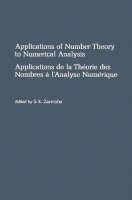Browse content
Table of contents
Actions for selected chapters
- Full text access
- Book chapterAbstract only
Some Combinatorial Problems Studied Experimentally on Computing Machines
S.M. ULAM
Pages 1-10 - Book chapterAbstract only
Experiments on Optimal Coefficients
SEYMOUR HABER
Pages 11-37 - Book chapterAbstract only
La Méthode des “Bons Treillis” pour le Calcul des Intégrales Multiples
S.K. ZAREMBA
Pages 39-119 - Book chapterAbstract only
Recherche et Utilisation des “Bons Treillis.” Programmation et Résultats Numériques
DOMINIQUE MAISONNEUVE
Pages 121-201 - Book chapterAbstract only
Methods for Estimating Discrepancy
H. NIEDERREITER
Pages 203-236 - Book chapterAbstract only
A Distribution Problem in Finite Sets
H. NIEDERREITER
Pages 237-248 - Book chapterAbstract only
The Structure of Linear Congruential Sequences
GEORGE MARSAGLIA
Pages 249-285 - Book chapterAbstract only
Statistical Interdependence of Pseudo-Random Numbers Generated by the Linear Congruential Method
U. DIETER
Pages 287-317 - Book chapterAbstract only
Computational Investigations of Low-Discrepancy Point Sets
TONY T. WARNOCK
Pages 319-343 - Book chapterAbstract only
Estimating the Accuracy of Quasi-Monte Carlo Integration
JOHN H. HALTON
Pages 345-360 - Book chapterAbstract only
Lattice Structure and Reduced Bases of Random Vectors Generated by Linear Recurrences
W.A. BEYER
Pages 361-370 - Book chapterAbstract only
A Transformation of Equidistributed Sequences
E. HLAWKA and R. MÜCK
Pages 371-388 - Book chapterAbstract only
On the Second Round of the Maximal Order Program
HANS ZASSENHAUS
Pages 389-431 - Book chapterAbstract only
Modulo Optimization Problems and Integer Linear Programming
GORDON H. BRADLEY
Pages 433-451 - Book chapterAbstract only
Equivalent Forms of Zero-One Programs
PETER L. HAMMER and IVO G. ROSENBERG
Pages 453-463 - Book chapterAbstract only
Incidence Matrices of Boolean Functions and Zero-One Programming
ABRAHAM BERMAN
Pages 465-477 - Book chapterAbstract only
Number Theoretic Foundations of Finite Precision Arithmetic
D.W. MATULA
Pages 479-489
About the book
Description
Applications of Number Theory to Numerical Analysis contains the proceedings of the Symposium on Applications of Number Theory to Numerical Analysis, held in Quebec, Canada, on September 9-14, 1971, under the sponsorship of the University of Montreal's Center for Research in Mathematics. The symposium provided a forum for discussing number theory and its applications to numerical analysis, tackling topics ranging from methods used in estimating discrepancy to the structure of linear congruential sequences. Comprised of 17 chapters, this book begins by considering some combinatorial problems studied experimentally on computing machines. The discussion then turns to experiments on optimal coefficients; a distribution problem in finite sets; and the statistical interdependence of pseudo-random numbers generated by the linear congruential method. Subsequent chapters deal with lattice structure and reduced bases of random vectors generated by linear recurrences; modulo optimization problems and integer linear programming; equivalent forms of zero-one programs; and number theoretic foundations of finite precision arithmetic. This monograph will be of interest to students and practitioners in the field of applied mathematics.
Applications of Number Theory to Numerical Analysis contains the proceedings of the Symposium on Applications of Number Theory to Numerical Analysis, held in Quebec, Canada, on September 9-14, 1971, under the sponsorship of the University of Montreal's Center for Research in Mathematics. The symposium provided a forum for discussing number theory and its applications to numerical analysis, tackling topics ranging from methods used in estimating discrepancy to the structure of linear congruential sequences. Comprised of 17 chapters, this book begins by considering some combinatorial problems studied experimentally on computing machines. The discussion then turns to experiments on optimal coefficients; a distribution problem in finite sets; and the statistical interdependence of pseudo-random numbers generated by the linear congruential method. Subsequent chapters deal with lattice structure and reduced bases of random vectors generated by linear recurrences; modulo optimization problems and integer linear programming; equivalent forms of zero-one programs; and number theoretic foundations of finite precision arithmetic. This monograph will be of interest to students and practitioners in the field of applied mathematics.
Details
ISBN
978-0-12-775950-0
Language
English
Published
1972
Copyright
Copyright © 1972 Elsevier Inc. All rights reserved.
Imprint
Academic Press
